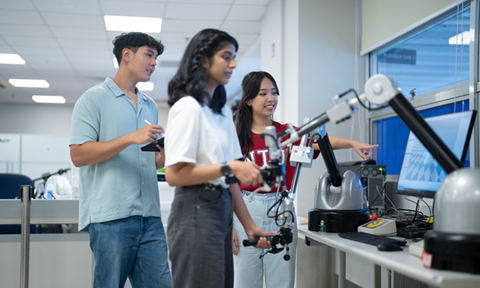Don't hand your brain over to Gen AI
Generative artificial intelligence (Gen AI) can boost your learning – or make you lazy. An NTU academic shares how to use it to sharpen your edge and stay indispensable in an AI-powered world
by Ian Tan
 Visual: ChatGPT
Visual: ChatGPTIt’s true, Gen AI can impact your smarts.
Just ask one of AI’s biggest investors, Microsoft, whose researchers found that high confidence in Gen AI was associated with less critical thinking. According to them, Gen AI can encourage users to accept responses without deeper reflection.
But I’m sure you know that already.
As an NTU academic who also helps organisations upskill in Gen AI, let me tell you how I nag at young people not to hand over their brains to the machine.
The AI didn’t eat my homework!
Many students ask me which jobs will survive the future.
I tell them: “The jobs where the boss gets to strangle you if something goes wrong. While many jobs may disappear, we still need humans who can get blamed for the wrong decisions, and perhaps praised for the right ones.”
When a worker submits a poorly written report, he cannot possibly tell the boss: “It’s all Microsoft Word’s fault!”
The same logic applies to using Gen AI. To many, an AI-generated piece of content looks good enough to submit to the boss. But what happens if it contains hallucinations that tank the company’s sales?
Now, to be that important person who gets hired in the future, you need to have the skills and experience to evaluate what AI produces. Your ability to evaluate AI-generated work will be all that stands between a soulless answering machine and your company’s fate.
What does that mean? You’ve got to get really good in your chosen area(s) of expertise.
Otherwise, how will you have an edge over the 10-year-old kid who’s going for prompt engineering classes?
I know Kung Fu
One of my favourite movie scenes is from The Matrix (1999), where Keanu Reeves has an entire library of Asian martial arts techniques uploaded to his brain and he awakens, exclaiming: “I know Kung Fu!”
While many people will be tempted to zig and let Gen AI do all the thinking, you can zag and learn faster than ever before by partnering with the machine.
First, you must reflect on why some topics feel so frustrating to learn.
The answer may be just that the reading or textbook is written in a convoluted way. Well, give the impenetrable content to ChatGPT or DeepSeek and type the prompt “eli5” (explain like I’m five).
Now that the topic has been broken down into its simplest elements, you do it! Try explaining what you have learnt to a friend or to your lecturer to impress them.
If anything, I hope Gen AI destroys the ability of humans to terrorise others with unnecessary jargon.
Compete with the machine for perfection
Let me tell you a secret. Even professional writers like me still have typos in every piece that we write. Forgive me, I am only human.
In the newsroom, I would have copyeditors using their fingers to point out the offending grammar mistakes in my writing. Thankfully, these days, as I type away in my NTU office, it’s much less painful. Before I publish anything (like this article), I will ask ChatGPT to “check grammar”.
Obviously, ChatGPT will fix my errors in a jiffy, but ah, the fun is in reducing the number of errors it catches each time. That’s me improving my writing accuracy with every new piece, and it doesn’t cost a cent.
On the other hand, it means the bar has been raised and now everyone in the office will know who DOESN’T use Gen AI for work. Interns, please take note.
It may seem daunting to compete against a machine, but what have you got to lose? A calculator already beat you in math years ago, yet you’re still here.
Even if AI does become our overlord, don’t go down without a fight.
STEAL MY PROMPTS
I dislike the term “prompt engineering”. As a true-blue arts guy, I find the term too elitist and not inclusive. Anyone can come up with a good prompt, as long as they think clearly and know what results they want to achieve. I also believe in writing very concise prompts. Here are some that I use regularly – do try them out.
“Create study notes from this text”
I find this crunches content better than the usual “summarise this” prompt. And you thought students were the only ones using AI to skim through boring textbooks or papers?
“Check the story flow", "Any gaps in logic?”
I use this to check the articles that I write for the media. It’s great to have another pair of eyes to make sure my story is written in a logical flow and to ensure I have covered the different perspectives sufficiently.
“Bridge these two paragraphs with a good transition”
Sometimes, I get writer’s block, and I will struggle to fit two ideas or paragraphs together in a smooth way. Gen AI is really good at plugging the gap, after which I will rewrite the provided text in my own words.
“Make this message kinder”
We all have bad days. But we should never take out our frustrations on someone else. When you are feeling crummy, stop, breathe and ask ChatGPT to tone down your message or email before hitting “send”. You will prevent many bridges from being burnt.
“Who is Ian Yong Hoe Tan” (ensure “web search” button is activated)
This isn’t just an ego trip. I do this to check that large language models like ChatGPT pull accurate details about me from my website, LinkedIn and NTU directory pages. People are increasingly using Gen AI to do web searches, and we need to make sure our online data is updated and accurate.
After you are done reading about my boring life, use this prompt to find out more about other people, things or companies. But remember: You still must verify the accuracy of the facts as Gen AI can hallucinate anytime.
Ian Yong Hoe Tan is a lecturer in strategic communication at NTU’s Wee Kim Wee School of Communication & Information.
This story was published in the Mar-Apr 2025 issue of HEY!. To read it and other stories from this issue in print, click here.






/theodore-kwan-7-attends-ntu-chemistry-lecture-as-a-guest.tmb-listing.png?Culture=en&sfvrsn=ccd9f4c9_1)
